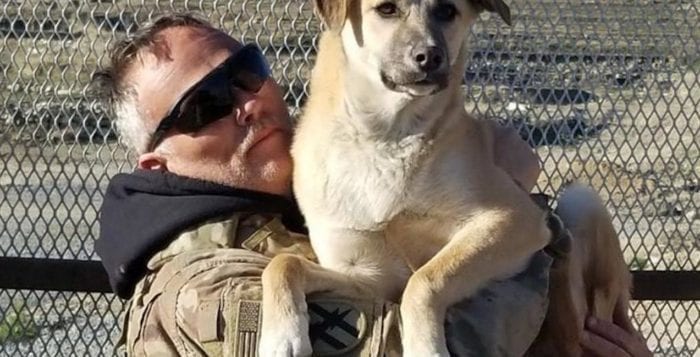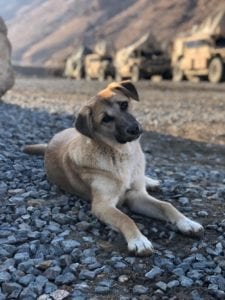Soldiers adopt war-torn dogs with the charitable aid of local organization

War is hell, but soldiers find solace in rescuing and adopting scared and abused animals from the battlefields overseas.

Paws of War, a nonprofit organization based in Nesconset, is dedicated to aiding veterans and their pets through an array of programs. Funded entirely by donations, it’s become a unique charitable cause that has caught the attention of local lawmakers as well as people actively serving in the military.
Tim Boyd is a U.S. soldier assisting Special Forces in the fight against ISIS, stationed in war-torn Afghanistan. He’s heading back to his home in Dallas, Georgia to retire after serving three decades in the military. He’s reached out to Paws of War to help transport a young dog named Mischa that he and his unit befriended, after rescuing the animal from abuse.
Paws of War typically helps reunite four dogs with soldiers each year and Boyd and Mischa are one of this year’s recipients of their altruism. “Humans truly have it backwards. We think we are rescuing the animal,” Boy said via email from an undisclosed location. “That is so much not the case, not with our fur babies. They undoubtedly rescued us.”
Soldiers saw the young animal being dragged by her neck, so they rescued and cared for her. Once stateside and out of “this godforsaken place,” Boyd said the dog can lay on his furniture instead of tearing up her feet running and walking the terrain of Nangarhar, Afghanistan.
When soldiers choose to adopt a dog found while serving the military, the process is intensive. “There’s a lot of red tape involved,” according to Robert Misseri, co-founder of Paws of War. Transporting the dog alone can cost $6,000, his office staff explained. That fee does not include the cost to travel to Georgia, once the dog arrives at John F. Kennedy International Airport. The flight, health certificates, customs fees and boarding along the way are all part of the expense.
Mischa is expected to arrive stateside before Boyd. His wife, Tara, will welcome Mischa, who already has adopted Mischa’s sister Bella Lynn. “Bella is also a pup that rescued me and our family when I found her washed under some tree branches out in the middle of the woods,” Boyd said.
Once Boyd and his troops return, he said he will be free to send a group photo that he has taken of Mischa with the unit. “I appreciate any and all assistance that people can provide in helping make Mission Mischa a successful operation,” Boyd said. “She needs to come home with me. I can’t imagine it any other way.”
Paws of War also provides service and therapy dogs to veterans suffering from post-traumatic stress disorder. People interested in knowing more about Paws of War programs or who might want to help with Mission Mischa can visit www.pawsofwar.org.






